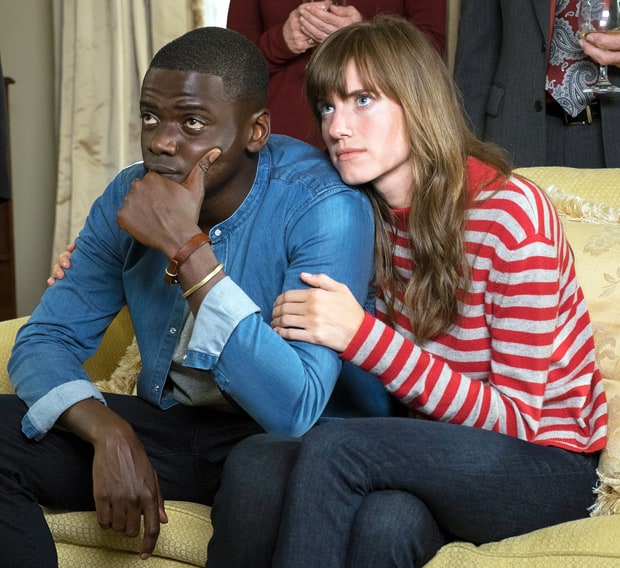By Laurie Coker
Rating: B
Clearly, a deeply satirical piece, director Jordan Peele’s new horror film Get Out, starts with a slow roll and builds to a jolt a minute revelation. Still, there is a predictability that over shadows many aspects of the fear factor. Thankfully, the film’s exceptional cast and Peele’s narrative – a biting commentary regarding race relations – elevates Get Out beyond the level of thriller and into impressive storytelling.
Jordan Peele, the co-creator of the award-winning Comedy Central sketch show Key & Peele and star of Keanu, has CREATED a remarkably inventive film that will have audiences surprised and not just with creepy characters and well-place musical crescendos. From a genre perspective, it tangles with obvious social taboos and sends clear, thought-provoking, and relevant messages.
Get Out stars Daniel Kaluuya and Allison Williams play a bi-racial couple – Chris and Rose, who take a weekend to visit her parents, who are “not racist at all.” From the onset, things just don’t sit right with Chris. The notably African America groundskeeper and housekeeper seem off – peculiar, unusual, dated even. Little is lost on Chris, but he loves Rose, so when on the first night, he is secretly hypnotized (supposed a smoking cessation exercise) by Rose’s mother (Catherine Keener) and then things go south – as in old South – fast. Peele’s satire is as clear as his horror tricks, and the blend works to keep viewers off their game.
Kaluuya brings it and Peele allows him to. True to his comedic edge, Peele gives Chris a hysterical friend (LilRel Howery), who tosses out truism after truism. He’s a TSA agent, a job for which he is loud, proud and avowed. He is the Chris’ compass – the man who says it real and does it with hilarious zeal. He is a minor character with a major impact and Peele does well in casting him. Williams is a beauty and Bradly Whitford (as her father), Caleb Landry Jones (her brother) and Keener round out a solid sinister domestic entity.
There are ominous goings on in the plantation-like house, with its wood-chopping man help and smiling, tea pouring kitchen gal. A garden party brings around more creepiness and crazy characters. Chris finally pays attention and makes an effort to “get out,” something his friend has told him over and over – it’s a trap, but it takes Chris some time to realize it and Peele time to play out his satire. The predictability of the horror elements is so blatant that Get Out lacks impact in the genre, but the addition of the relevant subject matter and the performances make its failings secondary to the satire.
Rated R, for violence, bloody images, and language including sexual references, Get Out puts Peele on a solid path to continued success. He wrote and directed Get Out and the title alone garners attention and dialogue – playing on the concepts of horror clichés – and Peele does satire well. Peele’s Get Out earns a B in the grade book – an average of superior satire and stock shock-elements.
